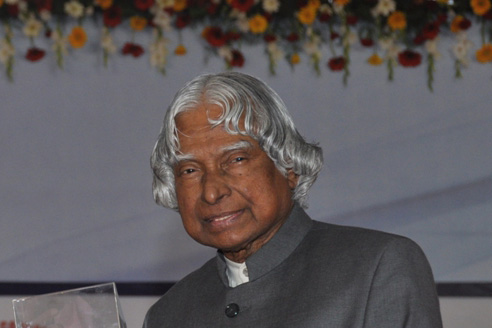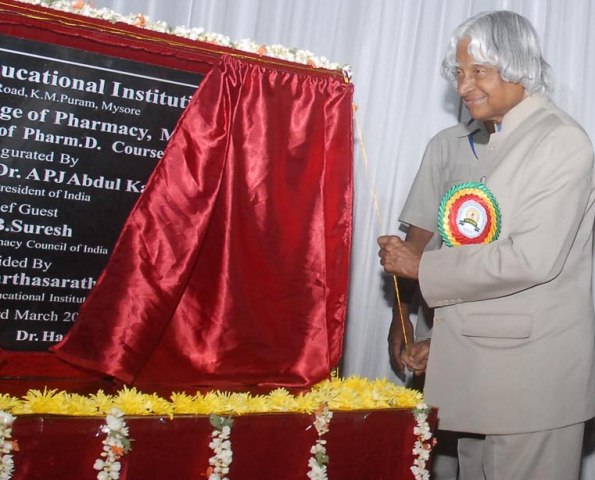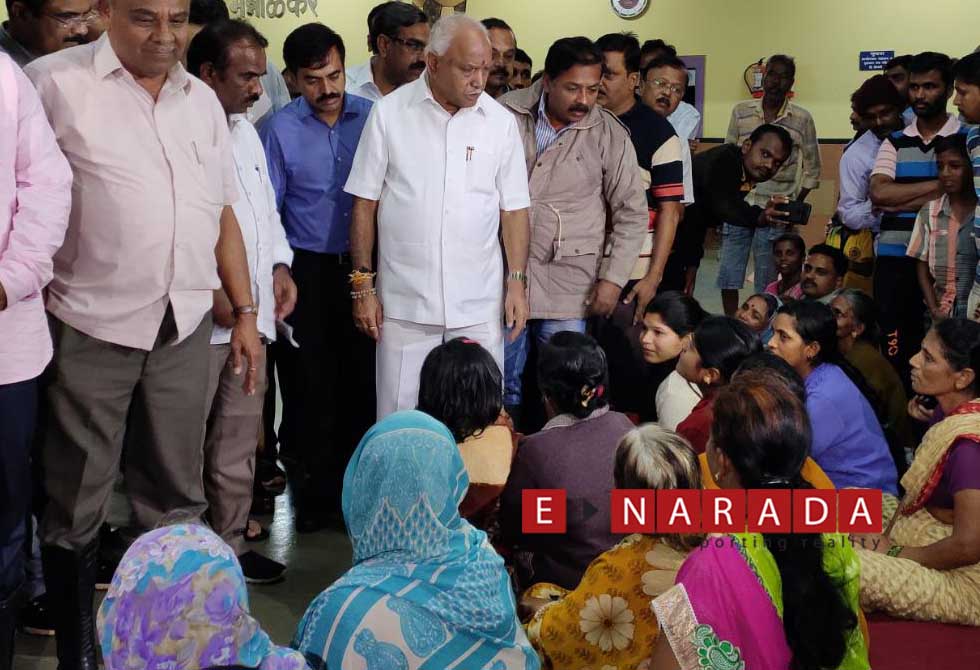Mysore, March 23, 2013:
Former President of India DR APJ Abdul Kalam today suggested that the power generated through renewable energy technologies has to be increased to 28 percent against the present five percent for energy Independence in the country.
In his JSS Mahavidyapeeta golden jubilee special lecture on the subject of “livable planet earth” here he said that India has 17 percent of the world’s population, but only about 0.8 percent of the world’s known oil and natural gas resources. Based on the progress visualized for the nation during the next two decades, the power generating capacity has to increase to 400,000 MW by the year 2030 from the current 130,000 mw. Energy independence has to got to be achieved through three different sources namely renewable energy, (solar, wind apart from hydro power), electrical power from nuclear energy and bio fuel for the transportation sector.
He said that the three critical problems facing the planet earth, first one was the continuous depletion of fossil material derived oil, gas and coal reserves as predicated by world energy form. The second was the continuous degradation of environment primarily due to extensive use of fossil materials for generating energy. Last one was the continuous rise of cost of crude. It was noticed that from under 25 dollars per barrel in 2003 September, the oil is now quoting at 106 dollars per barrel. Not only paying for the cost of fuel, but also paying for the continuous environmental degradation by importing the resulted carbon-di-oxide. The possession or rather the non-possession of oil also leads to conflicts, he added.
Talking on the solar energy, he said that solar energy in particular has the potential for massive applications in the agricultural sector, where farmers need electricity exclusively in the daytime. This could be the primary demand driver for solar energy; farmers demand for electric power today was significantly high, which makes solar energy economical due to its large scale. Shortages of water, both for drinking and farming operations could be met by large scale seawater desalination and pumping inland using solar energy supplemented by bio-fuels wherever necessary, he pointed out.
It was also necessary to embark on a programme in solar energy systems and technologies, for both large, centralized applications as well as small, decentralized requirements concurrently, for applications in both rural and urban areas. The key to success of this programme was the development of high efficiency photo voltaic cell using carbon nano tubes and solar thermal power plants, he added.
On nuclear energy, he said the present nuclear power capacity which was around 7000MW and number of nuclear reactor is in a completion stage. Eventually, the capacity by 2020 was expect ted to be increased to 24,000 MW. There was need to plan right from now to increase this capacity to 50,000 mw by 2030 through the combination of uranium and thorium based nuclear reactors…
Referring to energy in transportation sector in the country, DR Kalam said that the transportation sector in the country was the fastest growing energy consumer. The country import nearly 54 billion dollars (Rs 2, 20,000 crores) of oil annually and this bill was continuously increasing. Indigenous oil production meets only 25 percent of total requirements. Hence, there was an urgent need to find alternative fuels and energy sources since the cost of crude oil has already touched 106 dollars per barrel and the trend shows that there will be further increase. One of the promising areas for the country is production of bio-fuels in the case of transportation.
Stating that by adding 20 percent ethanol or bio-diesel to the fossil fuel based petrol or diesel, the savings nearly 11 billion dollars of foreign exchange. Simultaneously, once succeed in using emulsified fuel for automobile engines with 25 percent water; the savings would be nearly 14 billion dollars. The combined effect of using 20 percent bio fuewel and 25 percent emulsified fuel with water, the savings was about 25 billion dollars equivalent to rupees 100,000 crores annually at today’s exchange rate.
It was also essential that the rural economy should be driven by renewable energies such as solar, wind, bio fuel and conversion of municipal waste into power. With this approach, the core competences in the rural sector would be harnessed for sustainable development of the economy as a whole, he added.
Every nation needs a mission bigger than its people and bigger than the nation, can we evolve and present a great vision where the nation will be busy and committed, work globally, regionally and nationally resulting in conflict free, peaceful prosperous societies of the world, he said.
As usual The former president interacted with students with replying their questions .
later, Dr. Abdul Kalam participated as chief guest at the programme to mark the commemoration of 150 years of Sarada Vilas Educational Institutions at its Centenary Hall.





